German conglomerate Bosch to buy Roseville tech company, plans $1.5B investment at site
A major German tech conglomerate has announced plans to acquire TSI Semiconductors in Roseville, transforming the locally owned circuit manufacturer within the next few years into a facility that will make state-of-the-art chips used in electric vehicles.
Robert Bosch GmbH, a multinational company headquartered in Gerlingen, Germany, in a Wednesday news release said it would transform the TSI Semiconductors site at 7501 Foothills Blvd. into the “third pillar” of its semiconductor manufacturing operation, joining its two existing facilities in Reutlingen and Dresden.
The planned acquisition marks a potentially immense economic boost for Roseville, a suburban city of about 150,000 people 20 miles northeast of Sacramento that is already one of California’s fastest-growing: Bosch said it intends to invest $1.5 billion into its new California property.
It will also represent one of the first major projects in California since the passage of federal legislation last year that dedicated hundreds of billions of dollars to semiconductor manufacturing growth on U.S. soil.
“This $1.5 billion investment will bring down costs, strengthen our electric vehicle supply chain, help rebuild American manufacturing and create economic opportunity for the working families of California,” Vice President Kamala Harris said in a statement to McClatchy News. “And it will put more electric vehicles on the road, a priority I have worked for since I served in the United States Senate.”
Stefan Hartung, chairman of Bosch’s board of management, said in a statement that “existing cleanroom facilities and expert personnel in Roseville” will form a foundation for the company to scale up development and production of silicon carbide (SiC) chips, which are key components in modern electric vehicles.
After “retooling” the existing location, Bosch anticipates it will begin producing SiC chips in Roseville by 2026.
“This historic investment is extremely impactful as the automotive industry works on electrifying mobility,” Barry Broome, CEO and President of the Greater Economic Council, said in a statement. “As a region, we want to focus on expanding this industry to help build the supply chain as we continue to support future mobility.”
TSI Semiconductors has a manufacturing foundry with 150,000 square feet of “cleanroom” space along with its headquarters, both located in a campus on Foothills Boulevard near Roseville’s Pleasant Grove neighborhood, according to its website. Founded in 1984, the company currently produces application-specific integrated circuits (ASICs) used in various industries.
After retooling, the Roseville site will use about 10,000 square meters (108,000 square feet) of cleanroom space for SiC chip production, according to Bosch.

Bosch and TSI Semiconductors have agreed not to disclose financial details of the planned transaction. Bosch in Wednesday’s news release said TSI Semiconductors employs about 250 people.
In a statement, CEO Oded Tal said TSI Semiconductors is “pleased to join a globally operating technology company with extensive semiconductor expertise.”
Project’s full scale depends on federal funding, Bosch says
To what extent Bosch’s $1.5 billion investment into its new U.S. foothold might translate into new jobs is not yet clear.
“The full scope of the planned investment will be heavily dependent on federal funding opportunities available via the CHIPS and Science Act as well as economic development opportunities within the State of California,” Bosch said in Wednesday’s announcement.
The CHIPS and Science Act, passed by Congress and signed into law by President Joe Biden last August, allowed for $280 billion toward domestic manufacturing of semiconductors, including funding for subsidies, research and workforce training efforts and tax credits.
The first version of the legislation introduced in the House of Representatives in 2021 passed 215-207, with only one Republican vote in its favor.
“Unfortunately, House Republicans are working to undo our progress,” Harris’ statement continued. “They want to defund American manufacturing and ship jobs overseas. President Biden and I will never let that happen.”
What are silicon carbide (SiC) chips?
SiC chips are key components in electric vehicles, as they are more energy efficient than silicon chips that have been the industry standard for decades.
“In electric vehicles, SiC chips enable greater range and more efficient recharging, as they use up to 50 percent less energy,” Bosch wrote in Wednesday’s announcement.
Bosch’s two manufacturing sites in Germany have been producing SiC chips since 2021.
“Demand for chips for the automotive industry remains high,” the company wrote in Wednesday’s news release. “By 2025, Bosch expects to have an average of 25 of its chips integrated in every new vehicle.”
When it gets up and running, the Roseville site will be less than one-quarter the size of Bosch’s Reutlingen facility, which is currently 35,000 square meters (375,000 square feet) with plans to expand to 44,000 square meters (475,000 square feet) by 2025.
Though it will start smaller, the “location in Roseville will reinforce Bosch’s international semiconductor manufacturing network,” the company wrote.
“SiC chips are a key component for electrified mobility,” Markus Heyn, a Bosch board member and chairman of the company’s mobility solutions sector, said in a statement. “By extending our semiconductor operations internationally, we are strengthening our local presence in an important electric vehicle market.”
McClatchyDC’s Gillian Brassil contributed to this story.

